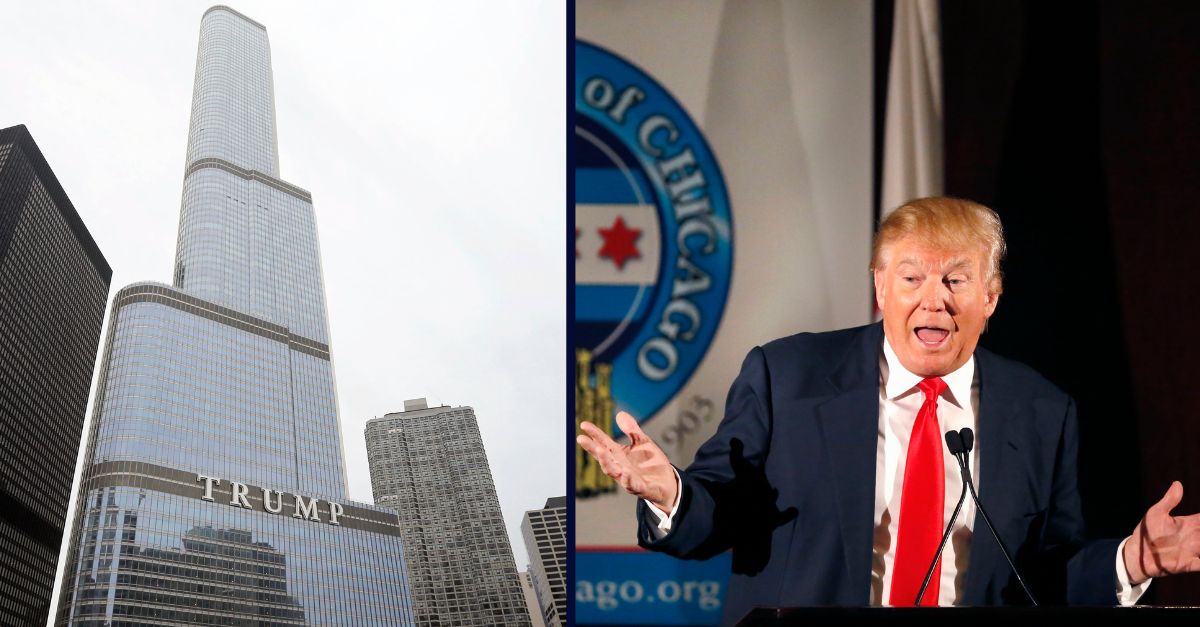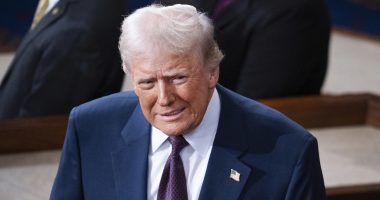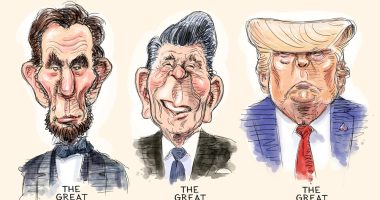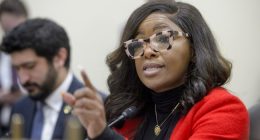
Left: This March 10, 2016 file photo shows the Trump International Hotel and Tower in Chicago. AP Photo/Charles Rex Arbogast/Right: Then-Republican presidential candidate Donald Trump speaks to members of the City Club of Chicago Monday, June 29, 2015, in Chicago. (AP Photo/Charles Rex Arbogast)
A federal watchdog group has sued former President Donald Trump, asking that the FBI and the Department of Justice investigate whether he knowingly and criminally made “material false statements” about a $50 million loan which “may have never existed at all.”
“The actions taken by Mr. Trump to misrepresent his loan obligations go well-beyond actions by other government employees who have fallen afoul of 18 U.S.C. § 1001(a) in recent years. His reporting of a non-existent loan dwarfs portrayals by other government employees, who have been prosecuted for failing to disclose far lesser amounts of their debt obligations,” Noah Bookbinder, president of the watchdog group, Citizens for Responsibility and Ethics in Washington, or CREW, wrote in the nascent complaint.
According to CREW, Trump may have made false statements by reporting over $50 million owed to Chicago Unit Acquisition LLC as a liability on at least nine public financial disclosure reports. Those reports were submitted to the Federal Election Commission as well as the Office of Government Ethics. This allegedly occurred from 2015 to 2023 and, as Bookbinder noted, “even though the loan appears to have never existed.”
“It is not clear why Mr. Trump would report a non-existent loan, but the law must be vigorously enforced against office holders and candidates who flout the disclosure process through repeated false statements. Failure to do so not only renders the system meaningless, but, more importantly, undermines the work of ethics officials who must ensure that financial disclosures are accurate so that potential conflicts of interest that present national security risks can be brought to light,” Bookbinder said.
These alleged discrepancies appear likely to be part of a tax avoidance scheme known as “debt parking” or, as the watchdog group claimed, Trump is attempting to hide “hidden debt” from someone — or something — else. Thursday’s lawsuit was first reported by the Daily Beast,
CREW is not alleging outright that Trump engaged in a tax scam but the formal complaint nonetheless asks both the head of the FBI Christopher Wray — who Trump appointed to run the FBI in 2017 after the ex-president fired James Comey — and the head of the Justice Department’s Public Integrity Unit Corey Amundson to probe the complex goings-on behind several of Trump’s public financial disclosures reports.
The now-defunct online news outlet The Messenger first reported in January that the existence of the mystery $50 million debt was detailed by Trump’s court-appointed monitor Barbara Jones — a former federal judge herself — inside of a footnote contained in a letter she sent to the judge presiding over Trump’s civil fraud case in New York, Justice Arthur Engoron.
In that matter, Engoron found that Trump, a few of his family members and business associates owed a combined $364 million plus fees and penalties to the state of New York after they committed massive civil fraud for more than a decade, misrepresenting real estate valuations and lying on financial statements in order to inflate net worth by the billions. As Law&Crime reported, that judgment, notably, was more than four times the amount Trump ended up owing writer E. Jean Carroll. He was found liable for defaming her and has been ordered to pay $83.3 million in damages plus interest.
As to this mystery $50 million loan now reemerging into the spotlight, it must raise questions about whether the former president attempted to evade paying taxes on income for years and to the tune of tens of millions of dollars, CREW says.
“Mr. Trump’s failures to accurately report loan information appear to be part of a continuing pattern to undermine public trust in the integrity of the public financial disclosure system as a whole. In this case, he appears to have misled the public in reporting loans to his own companies that he doesn’t really owe, but in other cases he failed to properly report loans he did owe,” Bookbinder told Wray and Admunson.
Mr. Trump’s actions are not just “eyebrow-raising,” he added. They could be criminal each time he signed a public financial disclosure tied to the Chicago loan and attested with his signature that “the statements I have made in this report are true, correct and complete to the best of my knowledge,” the complaint states.
“Meanwhile, he expressly acknowledged the loan disclosure itself when he was asked about it in his 2016 New York Times interview. Trump’s knowledge of the Chicago Loan’s disclosure is indisputably part of the public record,” CREW argued. “Furthermore, showing that the defendant has willfully violated the statute “does not require the government to prove the defendant’s specific intent,” only that the defendant “acted with knowledge that his conduct was unlawful.’ In this regard, covered PFD filers, like Mr. Trump, are given written notice of the legal consequences of knowingly and willfully making false statements,” Bookbinder wrote.
A spokesperson for Trump did not immediately respond to a request for comment Thursday.
Have a tip we should know? [email protected]








